conscient roundtables
why i started a series of informal conversations and why i think you might enjoy listening to them
Note: you can listen to my narration of this posting here
On February 25th, 2025 I published a conscient rethink where I introduced a new episode format, ‘roundtables’, as part of my 6th season :
Long duration, informal banter with friends and colleagues about their passions, fears and dreams, inspired by the innovative ways of the 1980’s era CBC Radio’s overnight talk show Brave New Waves. Participants are invited to tell a good story and to expect to be interrupted and maybe teased once in a while. A roundtable is an engaging kitchen party.
Each recording features artists and cultural workers sitting in a circle.
Sessions begin with a minute of silence to recognize and meditate upon the traditional custodians of the lands and waters wherever participants and audience members are situated.
(me holding our SONY d100 audio recorder speaking with the M’art and science’ roundtable group, 1 march 2025)
I then invite participants to speak their truth and audiences to listen in, as they might tune into a late night radio talk show or enjoy on a long road trip.
Participants don’t identify themselves as they speak however links to their bios and resources are included in the episode notes.
Technically it’s quite simple: we pass around a microphone like a talking stick.
(from left to right: Jimmy Ung (e164) Devon Hardy (e94), Katrine Klassens (e179), Sébastien Méric de Bellefon (e179), Alyssa Scott and Sophie Weider (e204), 1 march 2025)
At the first recording on March 1, 2025 in Montréal I began the session with this story :
Last night I dreamed that I received a bundle of arts wisdom - objects, stories, ways of being etc - and that I was invited to call upon to use content from the bundle to improve my art practice, after which I would add something to the bundle and pass it on to another artist. I had not realized until now that this bundle of arts wisdom is you all. Your stories and insights as creators, activists and visionaries is what is being added to the bundle today. The recording from this session is what is being passed to other artists.
origins of conscient roundtables
In a conscient rethink I presented listener feedback from previous seasons, notably:
your podcast is not enough fun : why don't you try to be more uplifting and positive?
Ouch.
How can I make a podcast about art and the ecological crisis (e.g. the end of the world as we know it) more fun?
I thought back to my young adult days, studying music composition at McGill University in Montreal in the 1980’s.
I used to listen to CBC Radio’s Brave New Waves late at night, especially in its first year.
Wikipedia provides some background (lightly edited by myself):
Brave New Waves is a Canadian radio program which aired on CBC Stereo, later known as CBC Radio 2, from 1984 to 2007. Airing overnight five nights a week, the show profiled alternative and indie music and culture, including film, comics, literature and art. The show was once described by longtime host Brent Bambury as "explaining fringe culture to a comfortable mainstream audience’. Produced throughout its run at the CBC's studios in Montreal and originally hosted by Augusta La Paix, the show aired for the first time on February 6, 1984. Throughout the 1980s, Brave New Waves was an influential show, providing many Canadians without access to campus radio with their main exposure to alternative music. In addition, the show also increased the profile of underground and experimental writers and artists and filmmakers, including Laurie Anderson, Kathy Acker, bill bissett and Todd Solondz.
It was fun.
Producer Alan Conter or others on the team called me up once in a while to talk about my electroacoustic music and youthful artistic follies.
Sometimes I was invited to stay on for group conversations late into the night.
These were magical times.
Time was suspended. Is it 2 or 3 am?
All that mattered was listening to artists speak their truth and enjoy playful banter on late night radio.
I felt connected.
And yes, I’m a bit sentimental for the good old days. :-)
(planning for conscient podcast, season 6, Ottawa)
David Bohm’s dialogic circles
On Friday February 21, 2025, while driving artist Devora Neumark to their hotel in Ottawa, I explained my premise for the conscient roundtables. I was grateful that Devora introduced me to David Bohm’s dialogue circles, which I hadn't heard of before. I turned on my iPhone audio recorder and captured their good advice:
There are four stages of the dialogic process according to David Bohm and the people who took part in these dialogue circles for decades, including William Isaacs, author of Dialogue: The Art of Thinking Together. These stages are not necessarily linear, but they tend to be constant.
The first one we can sum up as conviviality, pleasantness, people are polite, you're getting to know each other, everybody's on their best behaviour.
The second of four phases for dialogue is conflict. And that is consistent with the universe having conflict as one of the vectors for change. Right. Everything is conflict. It is not good or bad. It is the way that change happens. It's how you deal with the conflict, whether or not it becomes a force for good or force for destruction.
The third phase is the possibility of speaking your truth without fear of being judged or criticized.
The fourth are the conditions that contribute to you getting to the fourth phase? The fourth phase is the possibility. The possibility of thinking together.
So you tend to go through these phases. As you do that, the kind of leadership that you need from one phase to the other changes. So you can imagine that the kind of leadership needed for maintaining a space of safety even within conflict is different from the kind of leadership that you might need to elicit collaboration and each of the transitions from phase to phase has its own crisis. For example, the first, between the first and the second, the crisis is, am I who I think I am? It’s a crisis of suspension (of assumptions and judgment) The third to fourth conflict is: are we as a group who we think we are? This is a crisis related to confronting the collective suffering and difficulties that have accumulated in the group. These are not easy processes to go through.
And so the role of the leadership is to be able to sustain and hold space for these types of dialogic processes that go to where they need to go, right. It's helpful to know that conflict, when it arises, is a sign that people are really engaging. Disagreement is what is going to generate some type of change. Either a personal change, a collective change, a change of attitude, something. And it's not something to avoid. It's not something to say, okay, let's go on to something else.
But the leadership there has to be strong enough to be able to hold space for the conflict, to know that it is a necessary step to get to the third and fourth phase. You need to be able to speak your truth without fear of judgment or criticism so that you can hear me out and I can hear you out. We take it in. We are actively listening, and it can impact the way we think. Because now I'm really listening to you, and you're really listening to me. And from that listening, from that possibility of standing in our truth, we can move to thinking together, right? What does the group need to do? What are the actions that we need to take?
(Jimmy Ung, host of e209 and guest on conscient podcast e164 and balado conscient é28)
What are the actions that we need to take?
One action, well within our control, is to talk to each other and share our stories, knowing that these conversations are generative and healing, like a ritual.
That’s why I started the conscient roundtables and why I think you might enjoy them.
If you are so inclined, please feel free send me your feedback at claude@conscient.ca.
(from left to right back: Liz Shorten, Jai Djwa and Lucia Dekleer, from left to right front : Amir Niroumand and Sue Biely at recording of ‘e214 roundtable - in memoriam tracey friesen’, 16 March 2025, Vancouver)
With warm thanks to the producers and artists of Brave New Waves, to Devora Neumark for their insights on dialogue (an upcoming guest in season 6 in the ‘fifteens’ series) and to all roundtable participants for their generosity, courage and wisdom.


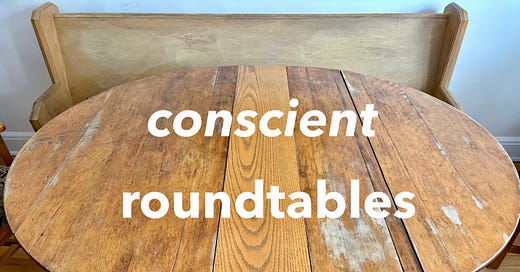



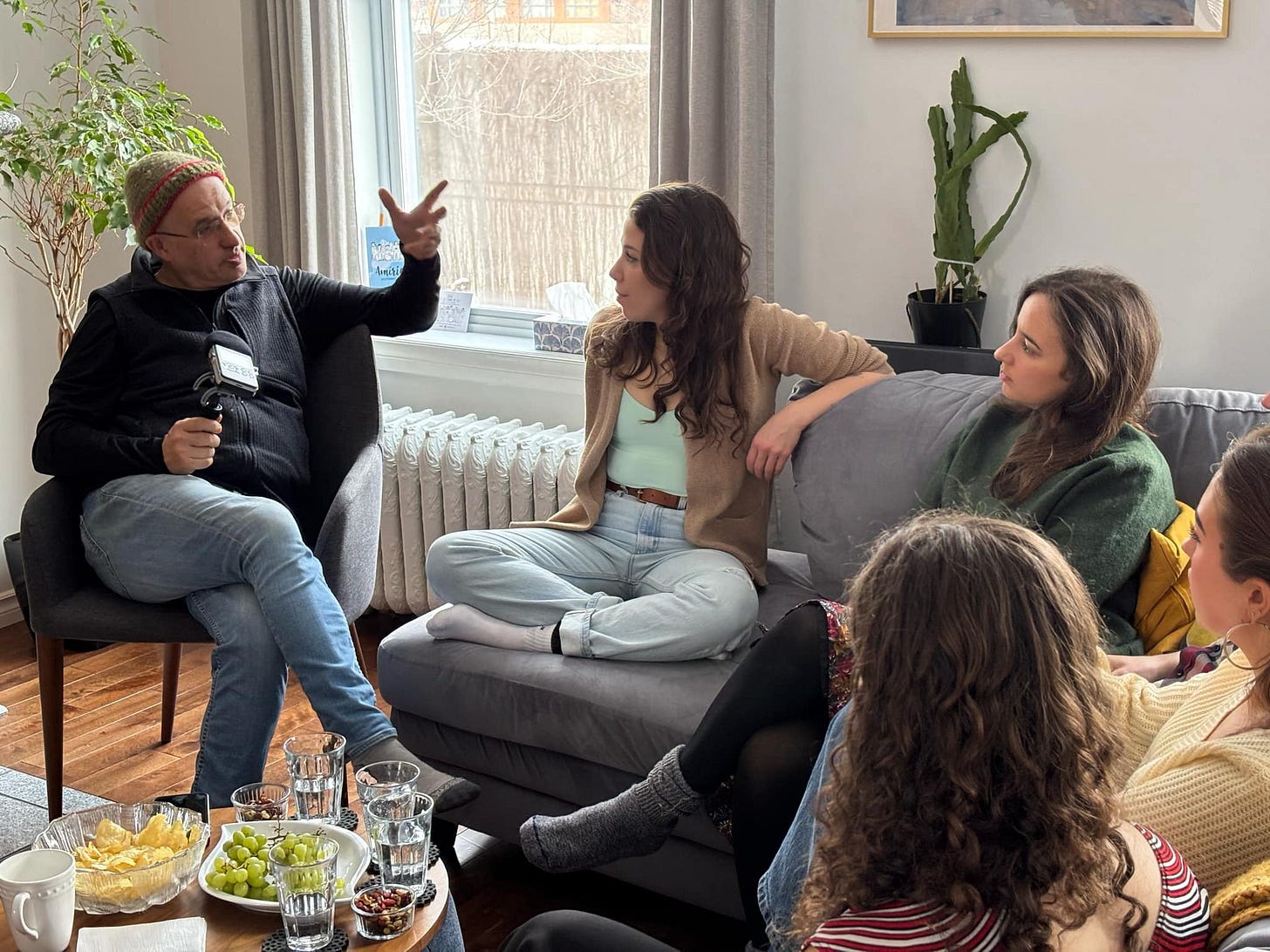

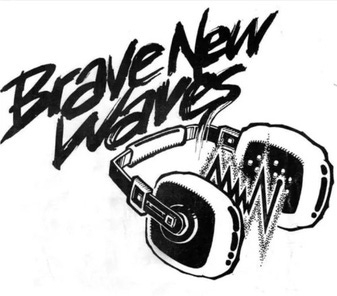
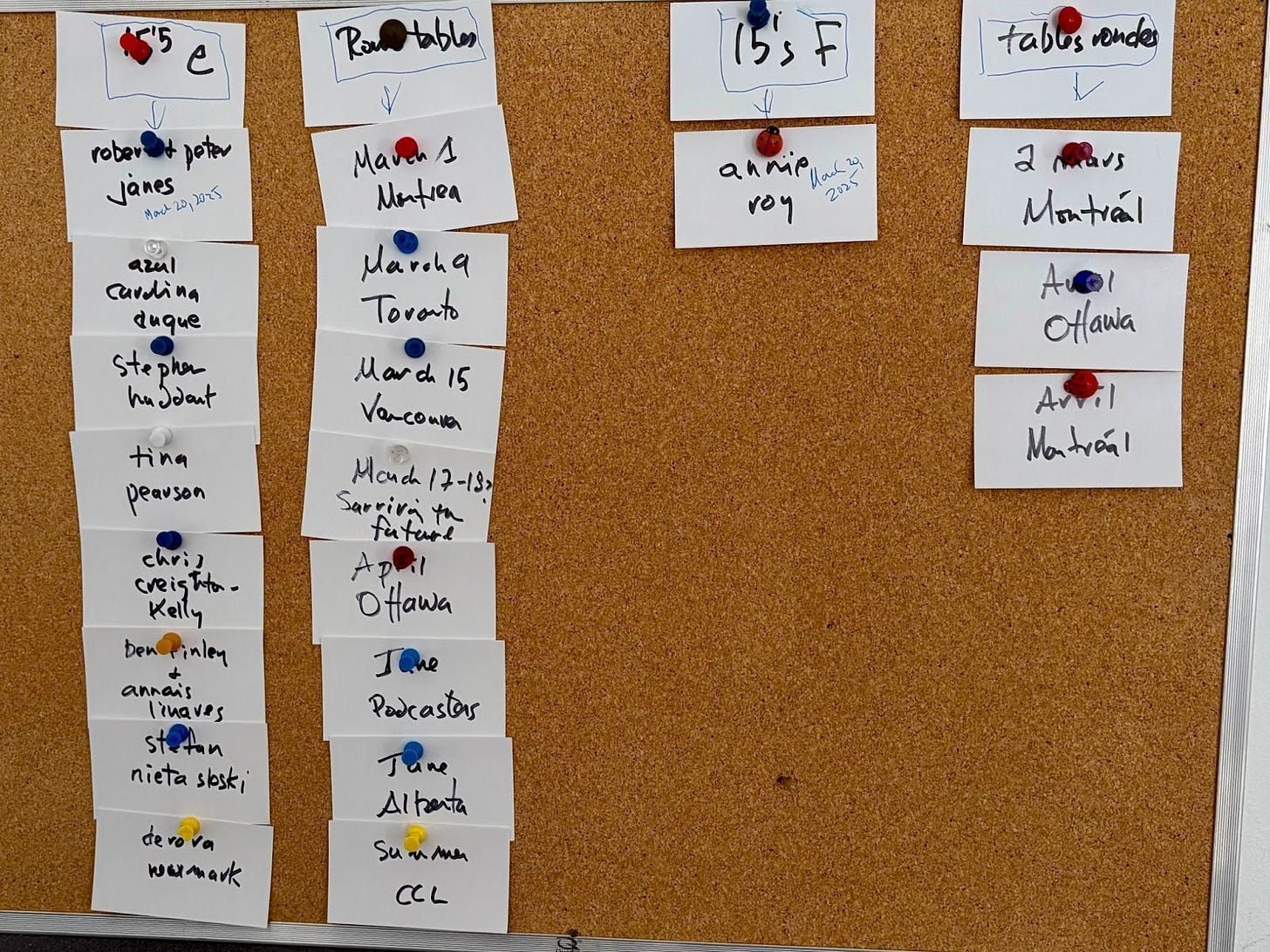

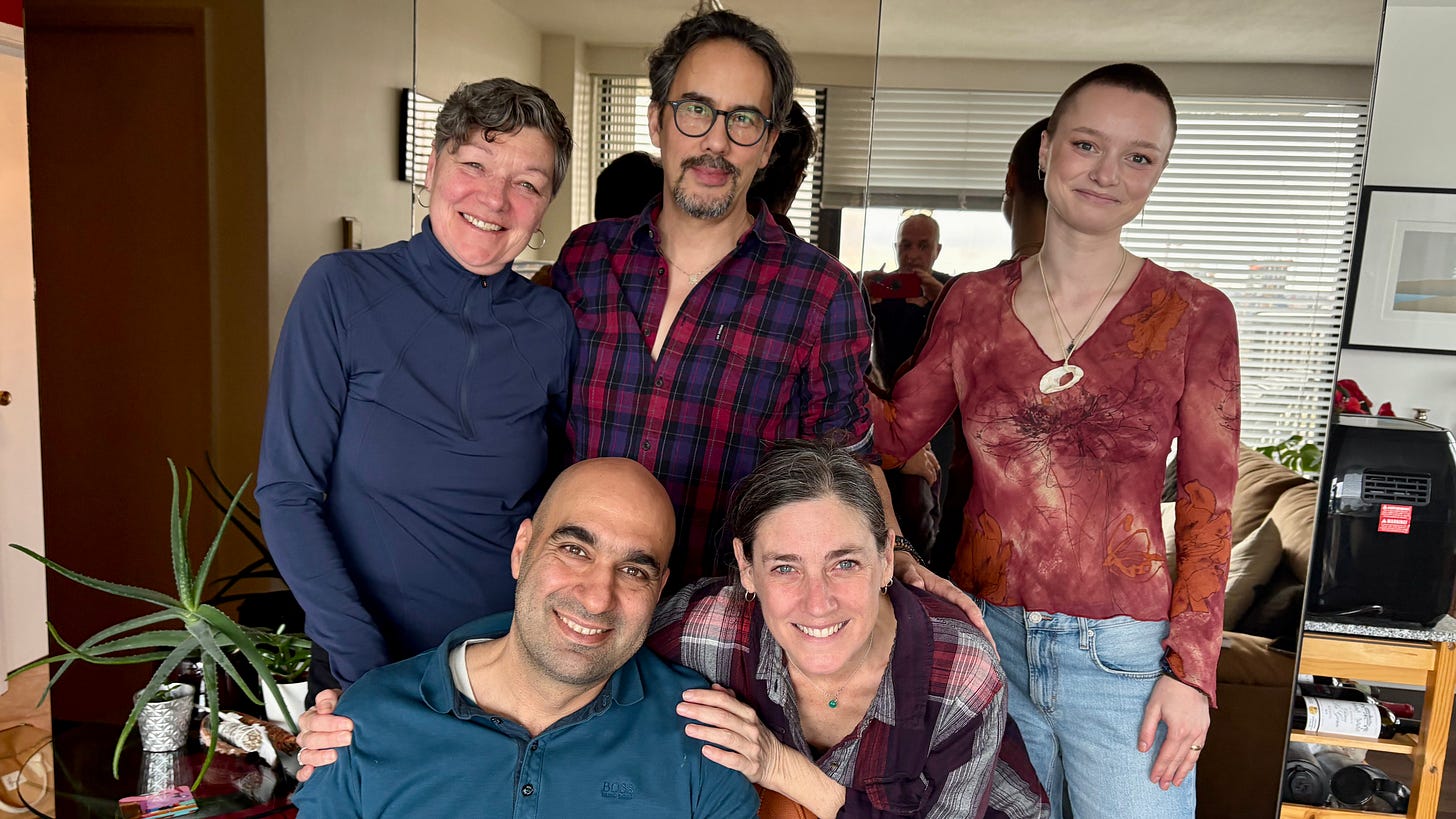
Hi Petra, both options are there. To read see https://acalmpresence.substack.com/p/conscient-roundtables-d86 to listen https://acalmpresence.substack.com/p/conscient-roundtables. we're back in Ottawa now until April 21.
Hi Claude, I am subscribed, but I would rather read than listen.
BTW are you back in Ottawa?
All the best,
Petra